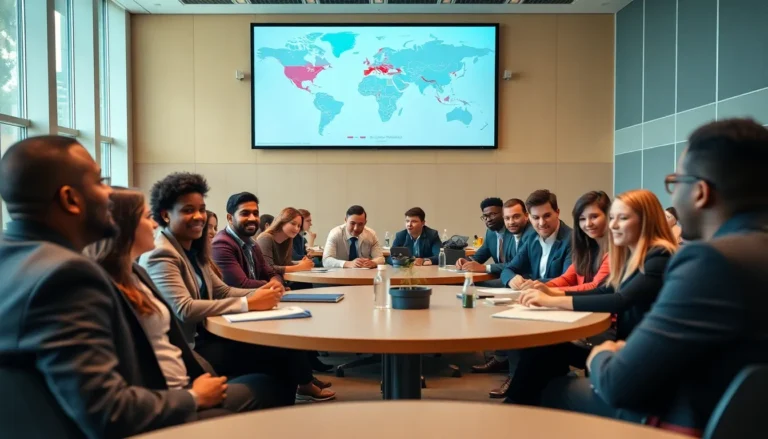Table of Contents
ToggleImagine diving headfirst into the complexities of international relations while sipping a latte in a bustling café, all while knowing you have the skills to navigate the world’s biggest challenges. If this sounds like your cup of tea (or coffee), a Master’s in Global Affairs might just be your ticket to transforming your career. Not only does this advanced degree prepare students to address pressing global issues, but it also opens the door to a plethora of exciting career opportunities. So, let’s unpack what this degree truly offers, shall we?
What Is a Masters in Global Affairs?

A Master’s in Global Affairs is an advanced degree designed for individuals aiming to understand the dynamics of global issues. Students often investigate into topics such as international relations, political theory, economic development, and human rights. This comprehensive program encourages critical thinking, fosters strategic analysis, and equips graduates with the necessary tools to address real-world challenges. Programs may vary, but the focus remains on preparing individuals to engage with global systems, analyze policies, and contribute to international dialogue.
Key Components of the Curriculum
The curriculum for a Master’s in Global Affairs encompasses a variety of subjects, ensuring a well-rounded education. Core courses typically include:
International Relations Theory
Understanding the frameworks that guide international interactions is crucial. This course emphasizes historical and contemporary theories shaping global politics.
Global Economic Issues
Economic factors influence nearly every aspect of global affairs. Students examine trade policies, financial crises, and development frameworks to understand economic interdependencies.
Human Rights and Humanitarian Issues
This segment tackles the global challenges surrounding human rights. Students analyze critical issues and learn about the legal frameworks designed to protect vulnerable populations.
Policy Analysis
Engaging with policy creation and evaluation is key in this field. Students learn how to analyze existing policies critically and propose effective alternatives.
Plus to these core components, many institutions integrate experiential learning through internships or fieldwork, allowing students to apply theoretical knowledge in real-world settings.
Career Opportunities After Graduation
Graduates of a Master’s in Global Affairs program find themselves well-equipped to tackle various roles in numerous sectors. Here are some enticing career paths:
International Organizations
Positions at the United Nations, World Bank, or international NGOs are common destinations. These roles often involve policy analysis, project management, or advocacy work.
Government and Public Service
Federal and state departments seek graduates to help develop and carry out policies that address global issues. Diplomats, foreign affairs analysts, and advisors are just a few positions available in this track.
Private Sector
Many corporations value global perspectives, leading graduates to roles in multinational enterprises where they may work on market strategies or corporate social responsibility initiatives.
Academia and Research
For those looking to contribute to knowledge in the field, teaching at universities or conducting research in think tanks can be fulfilling careers.
Admission Requirements and Application Process
Applying for a Master’s in Global Affairs generally involves a few standard steps:
- Academic Credentials: Most programs require a bachelor’s degree from an accredited institution, preferably in a related field.
- Transcripts: Official transcripts detailing your undergraduate performance will need to be submitted.
- Letters of Recommendation: These provide insight into the candidate’s readiness for graduate study. Choosing those who know your academic or professional work well is vital.
- Personal Statement: This is your chance to showcase your motivations and career aspirations. A compelling narrative can set your application apart.
- Standardized Test Scores: Depending on the institution, GRE or GMAT scores may be required. But, many programs have moved towards test-optional policies.
- Interview: Some programs may require an interview, which is where candidates can express their passion and fit for the program.
Top Institutions Offering Masters in Global Affairs
When it comes to selecting a program, a few institutions consistently rank at the top. Here are some noteworthy options:
Columbia University
Columbia’s School of International and Public Affairs offers a highly regarded Master’s in International Affairs with a focus on global affairs, policy, and strategy.
Georgetown University
Georgetown’s Walsh School of Foreign Service is renowned for its comprehensive global affairs program, which prepares professionals for careers in diplomacy, international development, and more.
London School of Economics and Political Science (LSE)
LSE offers a Master of Science in International Relations, focusing on the complexities of geopolitical dilemmas and global governance.
University of Sydney
For those searching for an international option, the University of Sydney has an exceptional program tailored for addressing global challenges with an Australian perspective.
The Future of Global Affairs Education
As the world becomes more interconnected, the importance of education in global affairs is undeniably growing. The curriculum is evolving, reflecting the swift changes in global dynamics:
Technology Integration
Digital tools and data analysis are becoming integral to understanding global trends. Programs are increasingly incorporating these technologies into their curricula, equipping students with skills essential for future careers.
Interdisciplinary Approaches
Today’s global challenges often require a blend of multiple disciplines. Educational programs are adapting by offering courses that span economics, environmental science, political theory, and more, reflecting the interconnected nature of today’s issues.
Increased Focus on Ethics
With globalization comes the need for ethical considerations. Future programs will likely emphasize moral frameworks and ethical dilemmas faced in global decision-making processes.





